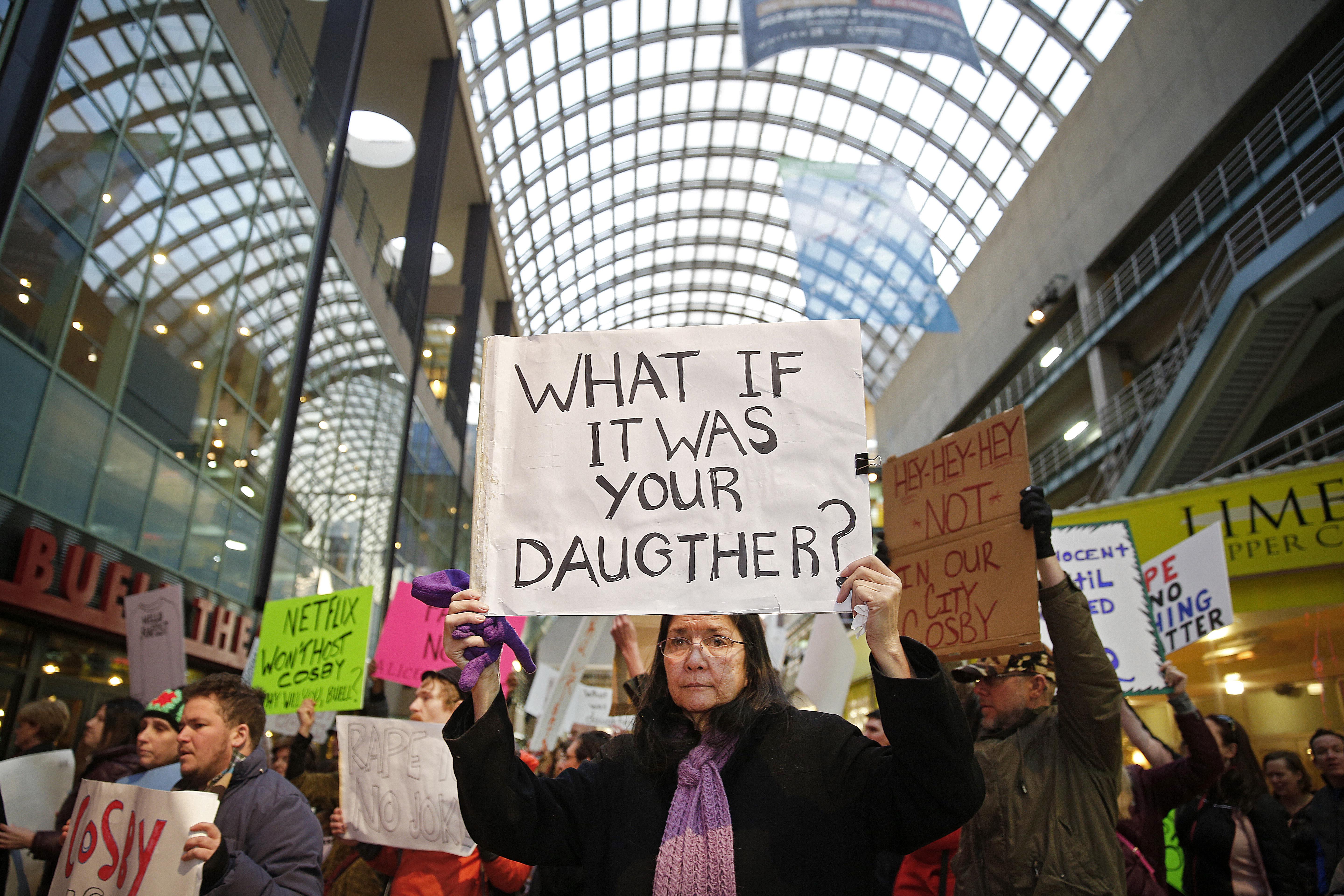In a neat and unexpected twist of justice, one of the first women who publicly accused Bill Cosby of sexual assault may be the first to see legal retribution. On Wednesday morning, Montgomery County, Pennsylvania, prosecutor Kevin Steele charged Cosby with a first-degree felony—aggravated indecent assault—for his alleged drugging and sexual assault of Andrea Constand in 2004. (Update, Dec. 30: Cosby was arraigned, and posted $1 million in bail on Wednesday afternoon.)
It shouldn’t take one Pennsylvania prosecutor’s authority to convince the public to believe scores of brave women over one famous man. But in a culture that perpetuates the myth of a vengeful, unstable liar who cries rape—and a year that gave fresh rounds of ammo to people who want to believe that most claims of sexual assault come from women who regret consensual sex after the fact—legal validation of a report of Cosby’s alleged abuse is an important win for survivors of sexual assault. Over the past year, Cosby has made several active attempts to demean and discredit his accusers. His attorneys have called their allegations “illogical” and “ridiculous.” He’s mocked his alleged victims onstage to gleeful applause in Ontario, where he told an audience member “You have to be careful drinking around me.” Earlier this month, the multimillionaire sued seven of his accusers for monetary damages for defamation.
And his plays for sympathy have worked. Even after more than 50 women have told remarkably similar stories of rape and assault, even after Cosby’s lawful arrest, plenty of people are still clamoring for the rest of us to “leave Bill Cosby alone.” They’ve said his career and reputation are already ruined and, at age 78, he’s too old to do any more damage; that vocal Cosby detractors are getting some kind of “sick pleasure” from harping on his misdeeds; that the liberal media has an undue vendetta against a conservative apologist who preached about black immorality. Hours after Cosby was charged, Thomas Mesereau, better known as Michael Jackson’s defense attorney, appeared on CNN and questioned the victims’ motivations:
Meanwhile, Cosby’s ominously titled “Far From Finished” tour made him boatloads of cash before ending in May, and gave his supporters a way to show their love. Even as protesters have mobbed Cosby’s appearances, most theaters have been forced to honor their standing contracts with him or face expensive lawsuits from the comedian. The Smithsonian’s National Museum of African Art has kept its Cosby-glorifying exhibition of Bill and Camille’s private collection on view for more than a year. It’s easy for some fans and institutions to hide behind caution—“innocent until proven guilty” and all that—to justify their support of alleged sex criminals like Cosby or R. Kelly. It’s harder, but certainly not impossible, to rally behind a convicted sexual abuser.
While dozens of women have come forward against Cosby in recent months, most of their accusations came long after the statute of limitations for his alleged crimes had expired. These new charges come in just under the 12-year deadline imposed by Pennsylvania law. Constand sued Cosby in 2005 when the former district attorney decided not to charge Cosby with a crime, and the parties settled out of court in 2006. Steele has justified his charges against Cosby with new evidence exposed this year in previously sealed depositions from the 2005 civil suit. In the transcripts, Cosby admits to obtaining Quaaludes for the purpose of plying women into sexual encounters; this aligns with Constand’s claim that Cosby drugged her with what he told her were herbal pills for anxiety, then assaulted her while she was incapacitated.
Also, Constand’s case could be the one of the easiest to argue and win out of all the allegations made against Cosby. In the 2005 deposition, Cosby defended himself by claiming that Constand enjoyed the sex acts. “I walk her out. She does not look angry,” he said. “She does not say to me, ‘Don’t ever do that again.’ She doesn’t walk out with an attitude of a huff.” But when Cosby allegedly assaulted her, Constand was in a romantic relationship with a woman. “As [Cosby] admits in his deposition, despite his talent for interpreting female reactions to him, he did not realize plaintiff was gay until the police told him,” Constand’s attorney, Dolores Troiani, wrote in a filing earlier this year. Of course, gay women can and do have consensual sex with men, but her self-identified sexual orientation could be a powerful counterpoint to the he said–she said arguments that cloud so many of these claims.
“Reopening this case was our duty as law enforcement officers,” Steele said in a press conference on Wednesday. “After examination of all the evidence, we are able to seek justice on behalf of the victim.” It took a jab from male comedian Hannibal Buress to get the public to fully grapple with allegations against Cosby that had been around for a decade, and it may take Cosby’s own admission to drugging women before sex to force any legal action against him. Outrageous though that may be, a criminal conviction that allowed us to stop using the word “alleged” to qualify abuses detailed by more than 50 women would be a decisive validation of stories too easily brushed aside for far too long.
